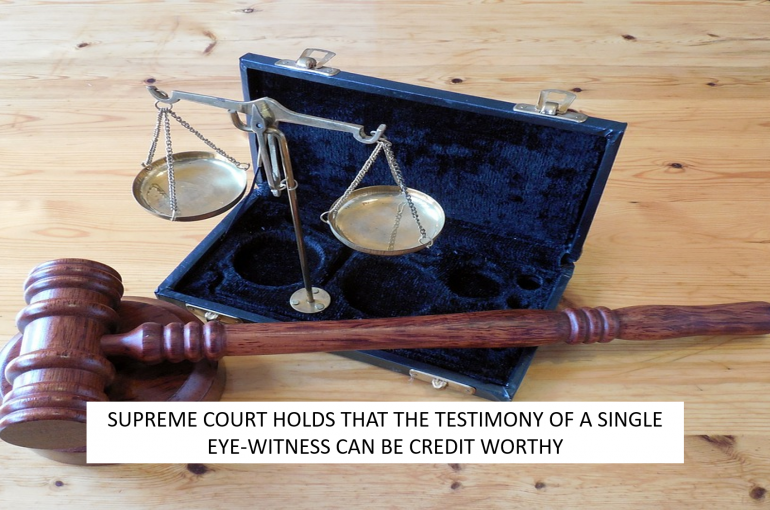SUPREME COURT HOLDS THAT THE TESTIMONY OF A SINGLE EYE-WITNESS CAN BE CREDIT WORTHY
Recently, a three-Judge Bench of the Supreme Court comprising Justice B.R. Gavai, Justice Vikram Nath and Justice Sanjay Karol passed a judgment dated 16.03.2023 in Ravasaheb @ Ravasahebgouda etc. vs State of Karnataka in Criminal Appeal Nos.1109-1110 OF 2010, and held that the quality and not the quantity of the witnesses matter and even the testimony of a single eye-witness is sufficient for the conviction of the Accused.
FACTS
The Victim, Satyappa was found to had been murdered in village Kaltippi, Jamakhandi Taluka, Karnataka. On the very same day, i.e., on 13.08.2004, F.I.R. was lodged with Terdal Police Station, District Bagalkot, Karnataka. The Investigation Officer, Shri Hanamappa Sangappa Keri, who conducted the investigation reached the spot and after making preliminary inquiries and conducting investigation, recovered the dead body and sent it for postmortem which was conducted by one Dr. Shabbir Patel. The post-mortem report duly proven by the said expert, does establish the Deceased to have sustained 21 stab injuries inflicted on different vital parts of the body. The multiple injuries on all the vital parts being serious in nature, were caused by sharp-edged weapon(s) that resulted in the death of the Deceased.
The Trial Court convicted all the eight Accused persons, namely, Ramappa (Accused No.1), Shanker (Accused No.2), Krishnappa (Accused No.3), Gulappa Gavappa Karigar (Accused No.4), Beerappa (Accused No.5), Ravasaheb Laxman Patil (Accused No.6), Yankappa Shivappa Naik (Accused No.7) and Parappa @ Gulappa (Accused No.8), for having committed murder of the Deceased with the use of different weapons, i.e., jambia/jambe (sharp-edged weapon) and button knives. The Trial Court observed that despite most of the Prosecution witnesses (32 in number) having turned hostile, the Prosecution case stood established beyond reasonable doubt, through the unrefuted testimony of the sole eyewitness Yankappa Panchagavi (PW-1). The Trial Court convicted the Accused persons and sentenced them to undergo imprisonment u/s 143, 147, 148, 504 & 302 of the Indian Penal Code, 1860 (IPC).
The aforesaid Judgment of the Trial Court was challenged before the Karnataka High Court wherein the High Court, while concurring with the reasons and findings returned by the Trial Court, took note of the facts of prior hatred between the Parties in relation to a boundary dispute. The High Court was of the view that the findings did not warrant any interference and that the Appeal was devoid of any merit; hence, it was dismissed by Order dated 20.11.2009
ISSUE
Whether the testimony of a single eye-witness is sufficient to convict the eight Accused for murder.
REASONING AND ANALYSIS
Aggrieved by the aforementioned Order dated 20.11.2009 of the Karnataka High Court, the Appellant moved the Supreme Court under Article 132 of the Constitution of India (Criminal Appeal to the Supreme Court).
The Apex Court relied on its previous judgment, Mrinal Das Vs. State of Tripura (2011) 9 SCC 479 wherein the Supreme Court observed that:
- “Corroborated part of the evidence of a hostile witness regarding the commission of offence is admissible. Merely because there is deviation from the statement in the FIR, the witness’s statements cannot be termed totally unreliable;
- The evidence of a hostile witness can form the basis of conviction.
- The general principle of appreciating the evidence of eye-witnesses is that when a case involves a large number of offenders, prudently, it is necessary, but not always, for the Court to seek corroboration from at least two more witnesses as a measure of caution. Be that as it may, the principle is quality over quantity of witnesses.”
In present case, The Apex Court observed that if a witness is absolutely reliable then conviction based thereupon cannot be said to be infirm in any manner.
“PW-1 is an interested witness, being the brother of the Deceased; as also he being the solitary witness upon which reliance is placed by the learned Trial Court is put forward as a ground before us to question the verdicts. The position of law as held in Harbans Kaur Vs. State of Haryana [(2005) 9 SCC 195] is clear in stating that there is no proposition of law which doubts the statement of a close relative simply for that reason.”
The Court further observed that a witness being a close relative is not a ground enough to reject the testimony. Mechanical rejection of an even “partisan” or “interested” witness may lead to failure of justice. The principle of “falsus in uno, falsus in omnibus” is not one of general application.
Conclusion
Thus, based on the aforesaid observations, the Apex Court dismissed the Appeal and noted that the Appeal lacked merit. The Apex Court further observed that merely because no recovery was made from anyone apart from Accused Nos.2 and 4 would not mean that others were not present at the scene of the crime, and simply because a number of witnesses had turned hostile, does not on its own give a ground to reject the evidence of solitary witness. Moreover, the Trial Court and the High Court below have found no reason to disbelieve the testimony of solitary witness.
Devashish Kakkar
Legal Associate
The Indian Lawyer





































Leave a Reply